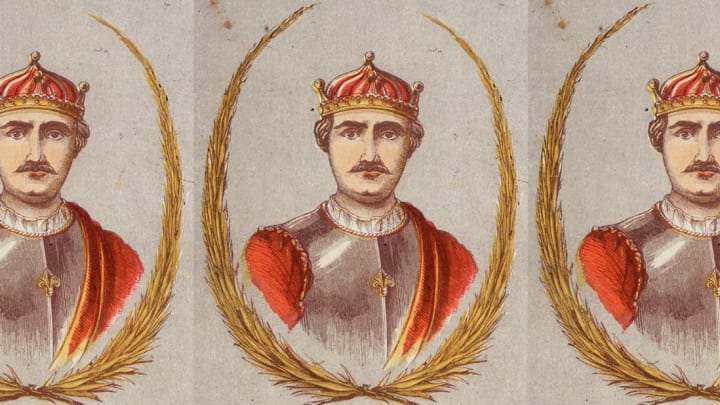by Alex Carter
William the Conquerer was an unlikely king who reigned brutally and met an equally brutal end.
Born out of wedlock circa 1028 to Robert I, the Duke of Normandy, and Herleva, who is traditionally described as a tanner’s daughter, he was commonly referred to as William the Bastard in his youth. When he was 8, William's father died, and William inherited his titles. His father's death threw Normandy into a civil war, and William's childhood was marked by brutality—which he seemed to embrace as he got older and ruled over the duchy. According to the BBC, he defeated a rebellion led by his cousin and punished the rebels by lobbing off their hands and feet. In 1066, when England's King Edward named another man his successor after supposedly promising the throne to William, the man who would be conquerer traveled from France to forcibly take the throne. Winning a victory at the bloody battle of Hastings, William was crowned king on Christmas.
Though William instituted constitutional and social reforms, forged close ties with France, and ended Viking influence in England during his reign, he was also a tyrant. In 1069, he began what would become known as The Harrying of the North—a campaign of putting down rebellions by burning villages and crops and slaughtering herd animals and even villagers. Those who survived were desperate (they reportedly resorted to cannibalism) and many starved to death.
William, however, ate like the king he was, growing fatter as he got older. In 1087, his girth would ultimately prove to be his downfall: While campaigning against his son Robert in France, William was injured when his horse unexpectedly reared up, thrusting the saddle into his abdomen with such force that it punctured his intestines.
The mortally wounded king journeyed to Rouen, where he spent six agonizing weeks dying with knights, noblemen, and clergy by his side. According to Orderic Vitalis's Historia Ecclesiastica, the king eventually confessed that what he had done during his reign was terrible:
"I treated the native inhabitants of the kingdom with unreasonable severity, cruelly oppressed high and low, unjustly disinherited many, and caused the death of thousands by starvation and war, especially in Yorkshire. ... In mad fury I descended on the English of the north like a raging lion, and ordered that their homes and crops with all their equipment and furnishings should be burnt at once and their great flocks and herds of sheep and cattle slaughtered everywhere. So I chastised a great multitude of men and women with the lash of starvation and, alas! was the cruel murderer of many thousands, both young and old, of this fair people."
He instructed that his wealth be given to churches and the poor, "so that what I amassed through evil deeds may be assigned to the holy uses of good men."
(Modern historians, however, doubt this speech ever passed William's lips. As David Bates writes in his book William the Conquerer, "[Orderic] has William express regret for the terrible bloodshed (multa effusione humani cruoris) as a part of his deathbed confession. Although the speech is, as far as we know, entirely Orderic’s invention and an idealized version of what he thought ought to have happened, what he was certainly saying is that he believed William made a good end, as also did Eadmer and William of Malmesbury.")
On September 9, William finally died, and the noblemen and knights who had surrounded him during his last days fled. "The lesser attendants, seeing that their superiors had absconded, seized the arms, vessels, clothing, linen, and all the royal furnishings, and hurried away leaving the king's body almost naked on the floor of the house," Orderic wrote. They left him, Oderic wrote, "as if he had been a barbarian."
This was a problem—no one who had attended the king in his life was there to make sure he was actually buried. Enter Herluin, a knight, who "was induced by his natural goodness to undertake the charge of the funeral, for the love of God and the honor of his country," Oderic wrote. "He therefore procured at his own expense persons to embalm and carry the body; and hiring a hearse, he caused it to be carried to the port on the Seine; and embarking it on board a vessel, conducted it by water and land to Caen.”
This trip, around 70 miles, likely took quite some time. As the corpse slowly made its way to Caen, the bacteria in the late King's gut leaked out into the rest of his body, decomposing the tissue at a frightening rate and filling the late king with putrid gas.
After the body arrived in Caen, the funeral was delayed by a fire that broke out in the city; many of the mourners ran to extinguish the flames. Then, during his funeral, the mourning party (including future King of England Henry) was accosted by a man claiming that the land the king wished to be buried in was actually his and that his family had been robbed of it so that the church could be built. The funeral turned into a lengthy legal meeting, and the heckler was ultimately compensated.
The delay had disastrous consequences: It caused the late king to inflate to enormous proportions in the heat. While trying to lower William into his final resting tomb, the king's corpse would not fit, and eventually, according to Orderic, his "swollen bowels burst, and an intolerable stench assailed the nostrils of the by-standers and the whole crowd." Nothing could cover the stench, and the funeral was hurriedly finished.
After that indignity, William didn't exactly rest in peace: His grave was disturbed three times, once on the orders of Rome (when he was reinterred), once at the hands of Calvinists, and then during the French Revolution. His bones were scattered, with the exception of a thigh bone; today, the final resting place of that bone is marked with a slab of stone.
